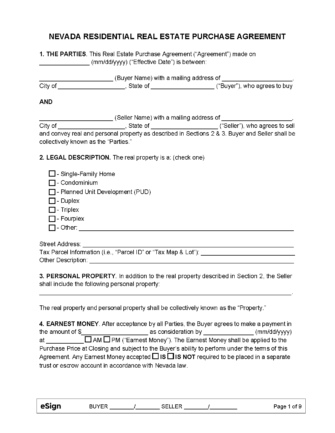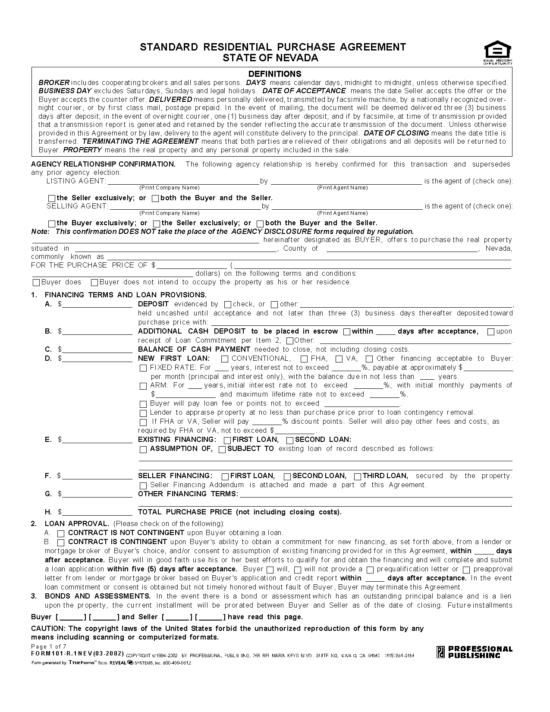

The Nevada residential purchase and sale agreement is a form used by individuals seeking to make a purchase offer on a residential property. The document allows the buying party to state their initial bid and the offer deadline, as well as any purchase conditions. The seller may reject or accept the buyer’s proposal, or instead present a counteroffer, a process that may require several negotiations.
If the buyer successfully reaches an agreement with the seller and is able to secure the property, both parties may provide their signatures on the form, and the ownership of the home will be legally conveyed to the buyer.

Nevada Residential Purchase Agreement – The official Nevada Association of Realtors residential purchase agreement allows licensed Nevada realtors to negotiate and execute residential real estate transactions.
1) Common Interest Communities and Condominium Hotels
When selling a unit or home in a common-interest community or condominium hotel, the seller is required to make the buyer aware of all the duties, rights, and other relevant articles of information related to being a resident of a common interest community or condominium hotel. The complete list of required provisions that must be included in the buyer’s disclosure statement is found in NRS statutes 116.4103 to 116.4107.
2) Impact Fees
Any seller of a home who is aware that their vendee will be subjected to “impact fees” must disclose via written notice that they are liable for upcoming charges, the amount remaining to be paid, and the name of the local government imposing the fee. The charges are transferred over to the seller if they neglect to provide the written disclosure.
3) Lead-Based Paint
Except for real estate transfers involving property newer than 1978, sellers are obliged to furnish the buyer a written document disclosing the potential risk of lead-based paint traces within a residence. A supplementary guide on how to recognize remnants of toxic paint and protect oneself from lead poisoning must also be provided.
4) Lien for Deferred Taxes
The purchaser of a property must be notified of any existing liens for deferred taxes that remained to be paid at the time of closing the sale.
5) Open Range Disclosure
Before the signing of a sale agreement for a home adjacent to an open range, the buyer must be provided a written disclosure stating that they cannot collect damages for livestock entering, grazing, or roaming inside the property, nor is it lawful for them to maim, harm, or kill any livestock that has entered the property. Furthermore, the disclosure must also inform the buyer that the property may be subjected to claims of rights-of-way from either the county or State pursuant to R.S 2477.
The seller of a home is required to complete a property disclosure document listing all the known defects and conditions within a residence that may adversely affect its worth and proper function. The seller or the seller’s agent must deliver the statement to the buyer at least ten (10) days before ownership of the property is transferred.
7) Water and Sewer Rates
If a previously unsold home receives water or sewerage services from a public utility that serves between twenty-five (25) and two thousand (2000) customers, the seller of the property shall post in a plainly visible location a written notice containing the charge rates for the services and the public utility and the Division of Consumer Complaint Resolution of the Public Utilities Commission of Nevada’s contact information. The purchaser of the home must also receive a copy of the notice prior to entering into a contract of sale.